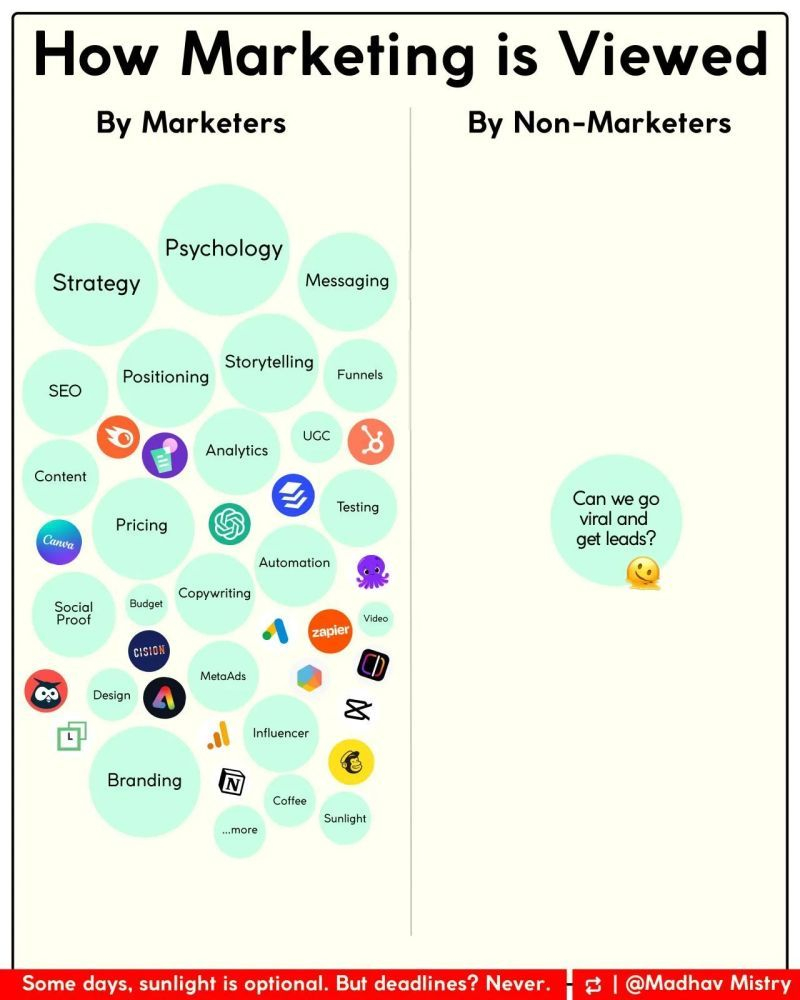Marketing? Just run some ads and get leads.”
I’ve heard this line a hundred times.
But here’s the truth:
- It oversimplifies a complex system
- It disconnects execution from strategy
- It devalues the real work marketers do
Marketing in 2025 isn’t “just ads.”
It’s an ecosystem:
- Strategy
- Psychology
- Storytelling
- Funnels
- Content
- Testing
- Automation
- Branding
(plus 20+ tools to stitch it all together)
And let’s be real:
Most marketers are running with 27 tabs open, 3 deadlines looming, and a cold coffee on the desk.
So when someone says, “Just post on Instagram,” they’re missing the point.
Marketing isn’t a department.
It’s a growth engine.
It takes skill, systems, and psychology to scale.
Want real growth?
Stop asking, “Can we go viral?”
Start asking, “What’s our narrative, funnel, and GTM plan?”
I’ve heard this line a hundred times.
But here’s the truth:
- It oversimplifies a complex system
- It disconnects execution from strategy
- It devalues the real work marketers do
Marketing in 2025 isn’t “just ads.”
It’s an ecosystem:
- Strategy
- Psychology
- Storytelling
- Funnels
- Content
- Testing
- Automation
- Branding
(plus 20+ tools to stitch it all together)
And let’s be real:
Most marketers are running with 27 tabs open, 3 deadlines looming, and a cold coffee on the desk.
So when someone says, “Just post on Instagram,” they’re missing the point.
Marketing isn’t a department.
It’s a growth engine.
It takes skill, systems, and psychology to scale.
Want real growth?
Stop asking, “Can we go viral?”
Start asking, “What’s our narrative, funnel, and GTM plan?”
Marketing? Just run some ads and get leads.”
I’ve heard this line a hundred times.
But here’s the truth:
- It oversimplifies a complex system
- It disconnects execution from strategy
- It devalues the real work marketers do
Marketing in 2025 isn’t “just ads.”
It’s an ecosystem:
- Strategy
- Psychology
- Storytelling
- Funnels
- Content
- Testing
- Automation
- Branding
(plus 20+ tools to stitch it all together)
And let’s be real:
Most marketers are running with 27 tabs open, 3 deadlines looming, and a cold coffee on the desk.
So when someone says, “Just post on Instagram,” they’re missing the point.
Marketing isn’t a department.
It’s a growth engine.
It takes skill, systems, and psychology to scale.
Want real growth?
Stop asking, “Can we go viral?”
Start asking, “What’s our narrative, funnel, and GTM plan?”
0 Comments
0 Shares
678 Views
0 Reviews








